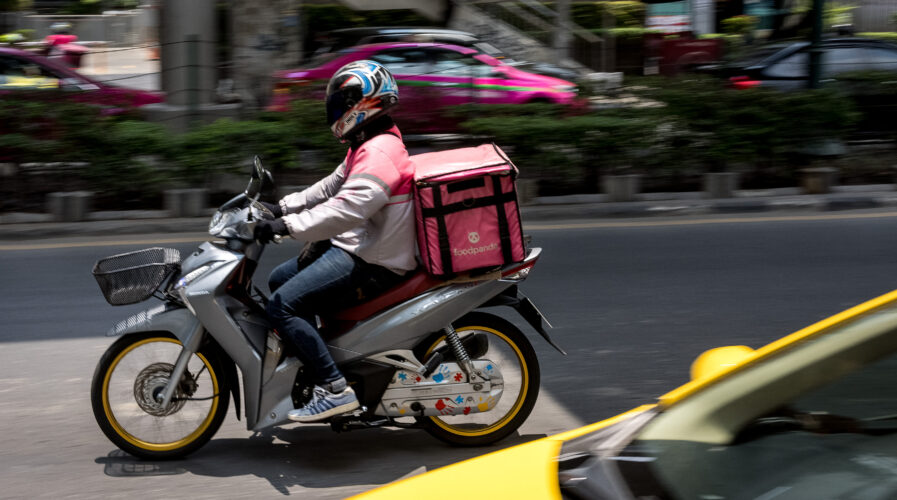
(Photo by Jack TAYLOR / AFP)
Foodpanda dedicated over US$ 35 million to grow micro SMEs
While most organizations were able to digitalize their business during the COVID-19 pandemic, most micro small, and medium enterprises (Micro SMEs) struggled to cope with the demands of technology. Not only were they outpaced and out skilled by modern tech, but micro SMEs did not also have sufficient funding to digitize their business.
In fact, according to a white paper on COVID-19 and tech adoption in SMEs by the World Economic Forum, some companies had plans for digitalization but decided to suspend or postpone them due to the economic impact of the pandemic. For some SMEs, due to the COVID-19 crisis, their businesses are facing the risk of bankruptcy. These companies are not in a position to make long-term development plans because most of their resources are being put into keeping the business afloat.
As such, the largest food and grocery platform in Southeast Asia, Foodpanda has dedicated over US$ 35 million to support communities, help Micro SMEs digitalize as well as train and upskill delivery riders across the region during the pandemic in 2021.
According to its first Social Impact Report, the company has taken to contribute to socio-economic and environmental sustainability challenges in Asia. This included uplifting riders, merchants, and customers to thrive through technology across its 12 operating markets – Bangladesh, Cambodia, Hong Kong, Japan, Laos, Malaysia, Myanmar, Pakistan, Singapore, Taiwan, Thailand, and the Philippines.
One key highlight in the report was the introduction of new digital tools that helped Micro SMEs expand revenue streams while training and upskilling for riders, and programs. Several local programs in Pakistan and Bangladesh successfully increased the percentage of economic participation from women entrepreneurs through the Home Chef program, while overall women ridership also increased compared to previous years. A new area of social impact focus in 2021 was the introduction of more sustainability initiatives across the region in 2021.
“Since Foodpanda was founded in 2012, we have been driven by our value to get 1% better every day, rolling out technical features that make millions of lives better. Technology has been an especially powerful tool to help sustain livelihoods, preserve business legacies, tackle environmental challenges, and build an inclusive platform for our community of merchants, riders, and customers to thrive,” said Jakob Sebastian Angele, Chief Executive Officer, Foodpanda.
The inaugural Social Impact Report features three key pillars which define Foodpanda’s social impact vision in Asia. The pillars are People, Progress and Planet.
People – In 2021, Foodpanda dedicated US$ 29 million to support Micro SMEs across the region, like wet market vendors in Thailand and Taiwan, local mom-and-pop shops in Malaysia and the Philippines, and hawkers in Singapore. This comprises new digital tools to help merchants expand revenue streams and connect with new customers online, as well as fee waivers and other relief initiatives. An additional US$6 million was invested in providing riders’ welfare and benefits, such as safety training, insurance, and financial support for the purchase of bicycles or motorbikes.
Progress – Foodpanda raised the level of economic participation from women across Asia, tripling the number of female riders in its fleet and financially empowering women Micro SME entrepreneurs on the platform through its Home Chef program in 2021. An additional US$ 91,000 was invested to upskill riders in Hong Kong, Malaysia, Singapore, and Taiwan, in language, personal growth, and marketing programs for future career readiness. In Singapore, Foodpanda dedicated 19,500 hours to mentoring mid-career professionals as they transition to data and software engineers.
Planet – To tackle environmental sustainability challenges in the food delivery industry, Foodpanda worked with local partners to improve food sustainability and reduce plastic waste for a low-carbon future. The platform also saved over 900 million pieces of single-use plastic cutlery through its cutlery opt-out feature.
The food and grocery platform is looking to expand its social impact initiatives in 2022 and in the years to come by positively empowering local communities to live better lives, powered by technology.
“COVID-19 has shown us how far we can go to make a positive change for our community of merchants, riders, and customers. Reflecting on the last two years of the pandemic, we raced to digitalize businesses and helped displaced workers transition to delivery riders to sustain their livelihoods, despite the impact of COVID-19,” Added Angele.
READ MORE
- Strategies for Democratizing GenAI
- The criticality of endpoint management in cybersecurity and operations
- Ethical AI: The renewed importance of safeguarding data and customer privacy in Generative AI applications
- How Japan balances AI-driven opportunities with cybersecurity needs
- Deploying SASE: Benchmarking your approach


